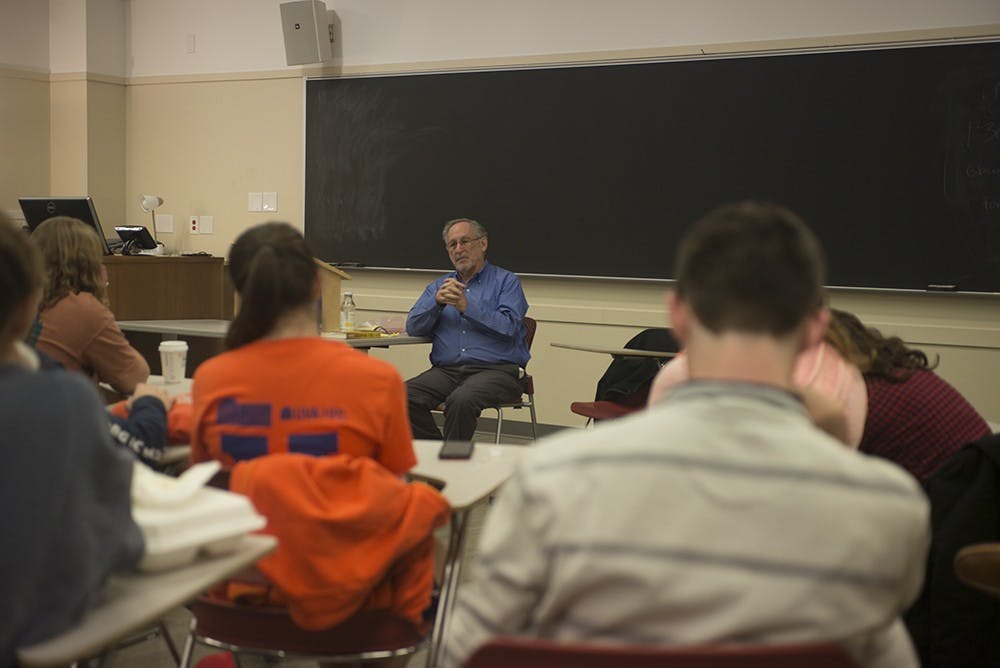South African-born Israeli journalist Benjamin Pogrund spoke to students Monday night about whether or not the term “apartheid” should be applied to Israel at an event hosted by the Brody Jewish Center.
Prior to moving to Israel, Pogrund spent 26 years working as a journalist in South Africa and reported on apartheid, a system of institutional racism against blacks that existed in South Africa from 1948 until the early 1990s.
While reporting in apartheid-era South Africa, Pogrund befriended reform leaders such as Nelson Mandela and spent a brief amount of time in jail. He also wrote a series of news reports about prison conditions for blacks and political prisoners under the apartheid government.
As a result of his reporting, “all hell broke loose, the government went berserk,” Pogrund said. Pogrund was prosecuted for years by the South African government for his journalism.
Pogrund currently lives in Israel and has become a critic of accusations of apartheid practices in Israel.
The accusation of apartheid in Israel stems from discrimination faced by Arabs in Israeli society, such as unequal access to land and that the “right of return” — in which any Jew in the world can return to Israel and become a citizen — does not apply to Arabs, who are a minority in the predominantly Jewish state, Pogrund said.
Additionally, a controversial barrier exists between the Arab-dominated West Bank — ruled by the Palestinian Authority — and the rest of Israel. These accusations of apartheid have been made by the Boycott, Divestment, and Sanctions (BDS) movement, which seeks to impose financial punishments on Israel for alleged apartheid policies.
Third-year Engineering student Luma Abunimer, president of Students for Peace and Justice in Palestine, said she believes the system being used in the West Bank and Gaza is “undoubtedly” apartheid.
“Archbishop Desmond Tutu, former President Jimmy Carter and many others have labeled the occupied territories as such,” Abunimer said.
According to U.N. definitions of the term, apartheid refers to “establishing and maintaining domination by one racial group of persons over any other racial group of persons,” Abunimer said, citing Article II of the INternational Convention on the Suppression and Punishment of the Crime of Apartheid.
“In the case of Israel proper, Palestinians are systematically treated as second-class citizens because of their racial identity,” Abunimer said.
Based on his experiences in South Africa, however, Pogrund said conditions in Israel are not indicative of apartheid.
“It doesn’t approximate what apartheid was in South Africa. apartheid was a literally racist policy that was enforced in every nook and cranny of society,” he said.
While Arabs in Israel face forms of discrimination, Pogrund said they are still recognized as citizens with equal rights. Unlike blacks in apartheid South Africa, he said, Arabs are able to vote in Israel. Additionally, he said Arabs have many of the same benefits as Jews, such as health care plans.
Pogrund admitted prejudice and discrimination are powerful forces in Israeli politics, but blamed the problems on “a total failure of leadership” by Israeli politicians and the use of security as a fear-mongering tool to justify controversial policies against Arabs.
In Pogrund’s view, a two-state solution reached “by agreement and negotiation” between Arabs and Jews is the only way out of the conflict. Solutions proposed by the BDS movement and other groups to return to former boundaries and provide the “right of return” to Arabs are “not going to happen,” Pogrund said, because Israel is ultimately a Jewish state.
Hoos for Israel President Jennifer Sachs said the use of the term apartheid in reference to Israel is not sensitive to the situation of apartheid in South Africa.
“Israel isn’t perfect, like any society, [but] using apartheid is undermining what apartheid was in South Africa and applying it very inappropriately to Israel’s situation,” the second-year College student said.
Fourth-year Commerce student Lee Silver, who attended the event, said Pogrund pointed out the issue is “not institutional racism … it’s security issues run amuck.” Nevertheless, Silver said Pogrund may have been “slightly overcritical of the Israeli position.”
Correction: This article previously did not specify the location referenced by Abunimer when discussing housing segregation and unequal education systems for Palestinians and Jews. This article also previous misspelled Abunimer.







